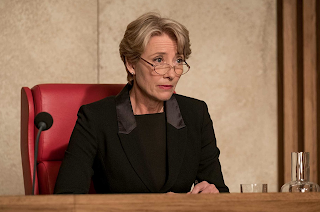 |
| Emma Thompson in "The Children Act" Photo Credit: Imdb.com |
Director Richard Erye brings us his contribution to the courtroom-drama genre with “The Children Act.” While the movie doesn’t reach the full potential of its screenplay, the film is held together by the strength of the performances from Emma Thompson and Fionn Whitehead.
Fiona Maye (Thompson) is a judge in the High Court of Justice of England and Wales who has handled many cases in her respected career. One day, she’s given a case where she must decide whether or not to allow a hospital to administer a lifesaving blood transfusion to a 17-year-old leukemia patient, Adam Henry (Whitehead), even though the treatment goes against his and his family's beliefs as Jehovah’s Witnesses.
Thompson exhibits a commanding presence as a judge who displays intense dedication to her profession. You're drawn into Fiona's arc as you see her character pour over her work to make sure that the right side wins. Thompson does a superb job in showing the audience her character’s thoughts as she makes tough decisions that risk placing Fiona in bad standing with the public, and she exhibits the firmness in which her character stands by her choices, creating a fascinating character in the process.
Stanley Tucci, who plays Fiona’s husband, does fine in his role, but his character isn’t given much to do. Also, it’s a little distracting that he doesn’t attempt a British accent, which takes you out of the movie from time to time. Tucci’s a talented actor, and I'm sure that he could have pulled off an accent if he had attempted.
Whitehead, who made his feature-film debut last summer as the lead in Christopher Nolan’s war drama, “Dunkirk,” has a role that allows him to display more of his acting abilities. Although he was terrific in “Dunkirk,” that movie had limited dialogue, so you couldn’t quite see what Whitehead could do beyond acting with mostly facial expressions. But, we now see of what he’s capable when given more dialogue with which to work. While Whitehead makes a strong first appearance when Fiona meets Adam in the hospital, it’s his scenes in the final third of the movie (the section of the film where most of his screen time is allocated) where more of the emotional complexities of his character come into full view, and it's here where you're provided with a wider glimpse of the talent that he possesses.
The screenplay by Ian McEwan, which is based on his 2014 novel of the same name, could have used more scenes between Adam, his parents, and them going between whether the former should receive the treatment, or if they should adhere to their beliefs. Whitehead is only given about 15 minutes of screen time, so it would've been great for his character to be expanded. Although Adam's situation in the film is time-sensitive, he and his parents have a lot of dramatic potential, so I would have liked to have a few more scenes that have him and his parents figuring out which route to take. While we're given a couple of scenes that show us a view of their beliefs and how they're influenced by them, I'm sure there's more to this aspect of the story that could've been shown.
One of the subplots involves a difficult stage in the marriage between Thompson and Tucci’s characters, and while their talents make this part of the narrative passable to watch, it's rather clichéd, and the story would have been better if it used those sections of the runtime to place more focus on Adam and his family. I know that the movie follows the same events as the novel, but a change like this would have worked in the story's favor.
Despite the shortcomings of the script, Erye is able to have the cast deliver the strong emotions of their characters as they traverse the difficult events at hand, and he does so while capturing the drama that transpires both inside and outside of the courthouse.
While "The Children Act" could've been better, Thompson and Whitehead still manage to give the film their all, despite the narrative not quite doing the same.
Grade: B
No comments:
Post a Comment